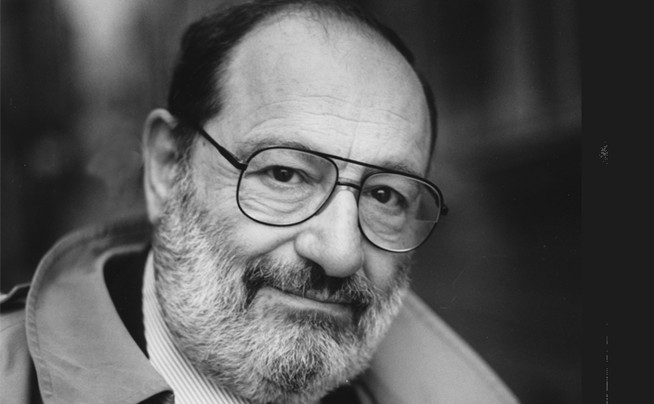Title: Numero Zero
Author: Umberto Eco
Genre: Fiction
Publisher: Houghton Mifflin Harcourt
Pages: 191
Price: $32.95
In Numero Zero Umberto Eco describes the debauched practice of news-making, and in so doing the renowned semiotician, prominent thinker, and celebrated author of The Name of the Rose, The Prague Cemetery, and Foucault’s Pendulum delivers a novel as shallow as the exercise he satirizes.
This is almost certainly intentional, as a writer as vigorous and a philosopher as significant as Eco did not become lazy and deficient overnight.
So what, then, is the 83-year-old’s objective for his seventh major work of fiction? What, assuming Numero Zero speaks to readers through opera aperta, or the open work approach to interpretation (a semiotic device), is Eco trying to say?
The answer, not surprisingly, is revealed in his own, previous texts—a sort of intimate intertextuality.
“When we consider a book,” he wrote in The Name of the Rose, “we mustn’t ask ourselves what it says but what it means.”
Eco put those words—a brief yet effective tutelage on media consumption—into the mouth of William of Baskerville, one of the more comforting, charitable, and illuminating protagonists in modern literature.
Numero Zero contains no comparable figure. Indeed, its forgettable raconteur—the self-styled “compulsive loser” Colonna—could almost be done without, were readers not dependent on his monotone narration.
A down-on-his-luck, divorced (although his failed marriage is only glossed over), middle-aged writer with a track record of manuscript reading and hack journalism, Colonna is hired by the unscrupulous Simei to ghostwrite a book about a newspaper that will never be published—the contrivance of a shady investor who hopes to blackmail his way into the “inner sanctum.”
Simei, as it turns out, provides what little insight the novel puts forth, and even then his musings are cloaked in a spiritless satire.
When he and Colonna meet the editorial staff of Domani, their bogus publication, he describes the target audience as “good, honest, middle-class folk, eager for law and order but desperate to read gossip and revelations about other people’s misfortunes.” In a later chapter he asserts that “readers don’t have a clue what happened 10 years ago.”
Eco continually mocks the manner in which media is consumed, and at one point uses Colonna to explain how a journalist might use a pair of quotations to shrewdly accommodate a particular mandate.
“In this way,” he tells the Domani staff, “readers are under the impression that they are being informed about two facts, but they’re persuaded to accept just one view as being more convincing.”
But the commentary on mass media doesn’t go much further than that. Meanwhile, the unwitting Colonna absorbs himself in relationships with two of the newspaper’s largely faceless staff. Maia—petite, moral, and slightly autistic—claims the protagonist’s romantic affections. The aptly named Braggadocio—a luxury car enthusiast and conspiracy theorist—piques his curiosity.
It is Braggadocio who introduces the Eco staple: a proposed conspiracy involving high-profile historical characters and events, potentially implicating a handful of secular forces as well as the Roman Catholic Church.
In Numero Zero the subject is Benito Mussolini, who, Braggadocio portends, was not executed near Lake Como but was either harboured by The Vatican or smuggled to Argentina, leaving his fate—and the abuse of Piazzale Loreto—to an unfortunate body double.
From there Braggadocio, whom Eco seems to have written solely for this purpose, reads off a roll call of plotters and co-conspirators, including Junio Valerio Borghese, Paul Marcinkus, and NATO’s Gladio “stay-behind” operation, and victims such as prime minister Aldo Moro and Pope John Paul I—an interesting roster, but a line of suspicion that doesn’t even approach that proposed by Simone Simonini in Eco’s sixth novel, The Prague Cemetery.
“Perhaps,” Colonna finally puts to him, “it’s just your tendency to see conspiracies everywhere, so you put two and two together to make five.”
“The trouble is,” retorts Braggadocio, “facts get lost between one piece of news and another.”
Not surprisingly, the latter’s murder seems to validate his theory, but as the reader is neither compelled by his shoestring suspicions nor by him as a character there is little emotion in his demise. As for Domani’s other staff members, they are scarcely missed when a paranoid Simei shuts up shop. In all likelihood the reader has forgotten their names.
And that’s when the light goes on.
What Eco has done with Numero Zero is deliver the depthless product Simei described to his staff. It is frivolous, unsubstantial, and entirely intentional. The mistake would be to read it as a series of sentences, or paragraphs, or scenes. It must be breathed in as a whole, as a work consumed and considered in a single inhalation.
“I believe that what we become depends on what our fathers teach us at odd moments, when they aren’t trying to teach us,” Eco writes in Foucault’s Pendulum. “We are formed by little scraps of wisdom.”
Eco hasn’t stopped teaching with Numero Zero. Rather, he continues—albeit through unlikely means—to communicate how best to read, how best to consume information. It’s not “what it says;” it’s “what it means.”
Numero Zero is Colonna’s ghost-written book. Numero Zero is Domani. It is a single burst of Eco’s laughter, and if read correctly invites its readers to laugh alongside.
***
Jerrad Peters is Creative Content Specialist at Providence University College and Theological Seminary and his articles have been published by The New York Times, The Mirror and the Winnipeg Free Press.
You can follow him on Twitter: @JerradPeters
